Raoul-Gabriel Urma Mario Fusco - Java 8 in Action: Lambdas, streams, and functional-style programming
Here you can read online Raoul-Gabriel Urma Mario Fusco - Java 8 in Action: Lambdas, streams, and functional-style programming full text of the book (entire story) in english for free. Download pdf and epub, get meaning, cover and reviews about this ebook. year: 2014, publisher: Manning Publications, genre: Computer. Description of the work, (preface) as well as reviews are available. Best literature library LitArk.com created for fans of good reading and offers a wide selection of genres:
Romance novel
Science fiction
Adventure
Detective
Science
History
Home and family
Prose
Art
Politics
Computer
Non-fiction
Religion
Business
Children
Humor
Choose a favorite category and find really read worthwhile books. Enjoy immersion in the world of imagination, feel the emotions of the characters or learn something new for yourself, make an fascinating discovery.
- Book:Java 8 in Action: Lambdas, streams, and functional-style programming
- Author:
- Publisher:Manning Publications
- Genre:
- Year:2014
- Rating:4 / 5
- Favourites:Add to favourites
- Your mark:
Java 8 in Action: Lambdas, streams, and functional-style programming: summary, description and annotation
We offer to read an annotation, description, summary or preface (depends on what the author of the book "Java 8 in Action: Lambdas, streams, and functional-style programming" wrote himself). If you haven't found the necessary information about the book — write in the comments, we will try to find it.
Java 8 in Action is a clearly written guide to to the newfeatures of Java 8. The book covers lambdas, streams, andfunctional-style programming. With Java 8s functionalfeatures you can now write more concise code in less time, and alsoautomatically benefit from multicore architectures. Its timeto dig in!
Summary
About the Book
Every new version of Java is important, but Java 8 is a gamechanger. Java 8 in Action is a clearly written guide to the newfeatures of Java 8. It begins with a practical introduction tolambdas, using real-world Java code. Next, it covers the newStreams API and shows how you can use it to make collection-basedcode radically easier to understand and maintain. It also explainsother major Java 8 features including default methods, Optional,CompletableFuture, and the new Date and Time API.
This book is written for programmers familiar with Java andbasic OO programming.
Whats Inside
How to use Java 8s powerful new features
Writing effective multicore-ready applications
Refactoring, testing, and debugging
Adopting functional-style programming
Quizzes and quick-check questions
About the Authors
Raoul-Gabriel Urma is a software engineer, speaker,trainer, and PhD candidate at the University of Cambridge. MarioFusco is an engineer at Red Hat and creator of the lambdajlibrary. Alan Mycroft is a professor at Cambridge andcofounder of the Raspberry Pi Foundation.
Raoul-Gabriel Urma Mario Fusco: author's other books
Who wrote Java 8 in Action: Lambdas, streams, and functional-style programming? Find out the surname, the name of the author of the book and a list of all author's works by series.

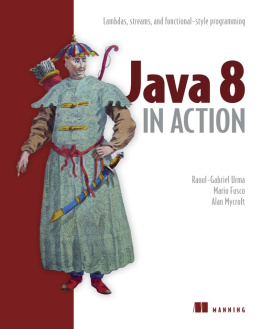

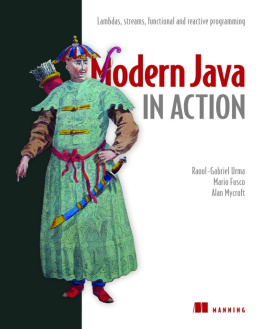
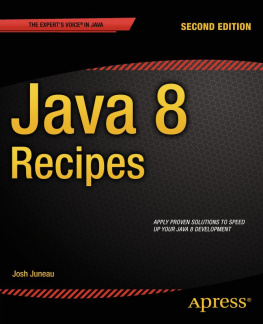
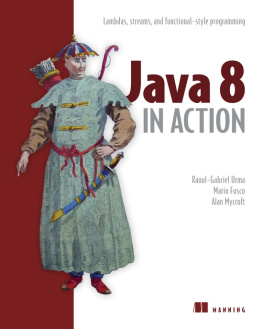
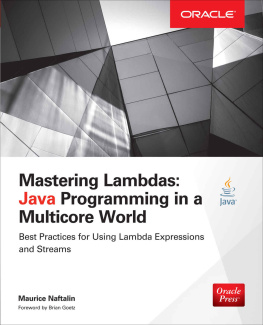
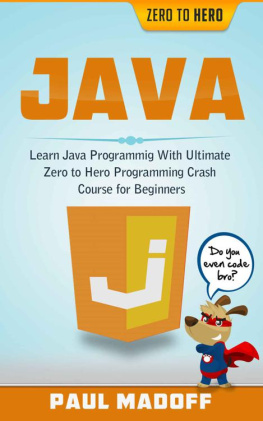
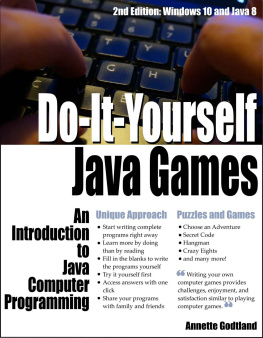
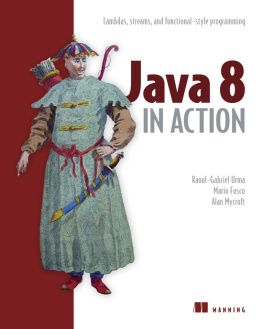
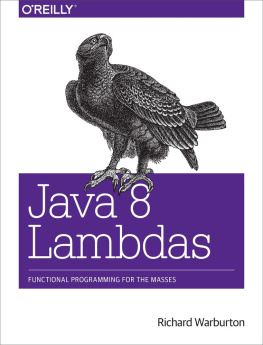

 Recognizing the importance of preserving what has been written, it is Mannings policy to have the books we publish printed on acid-free paper, and we exert our best efforts to that end. Recognizing also our responsibility to conserve the resources of our planet, Manning books are printed on paper that is at least 15 percent recycled and processed without the use of elemental chlorine.
Recognizing the importance of preserving what has been written, it is Mannings policy to have the books we publish printed on acid-free paper, and we exert our best efforts to that end. Recognizing also our responsibility to conserve the resources of our planet, Manning books are printed on paper that is at least 15 percent recycled and processed without the use of elemental chlorine.